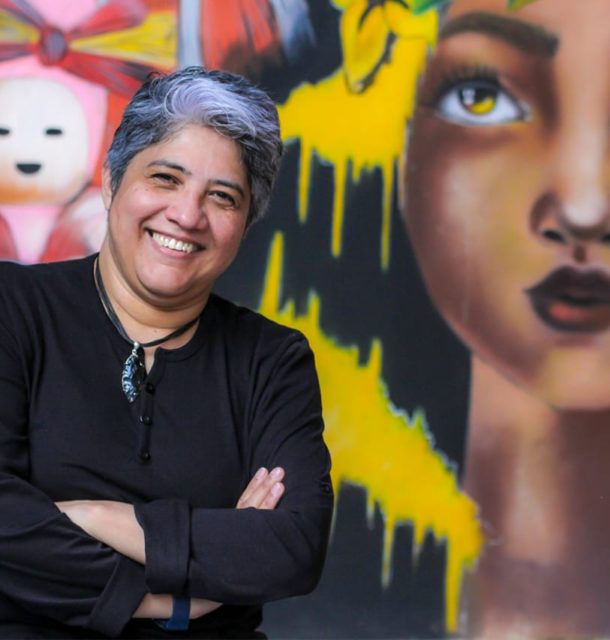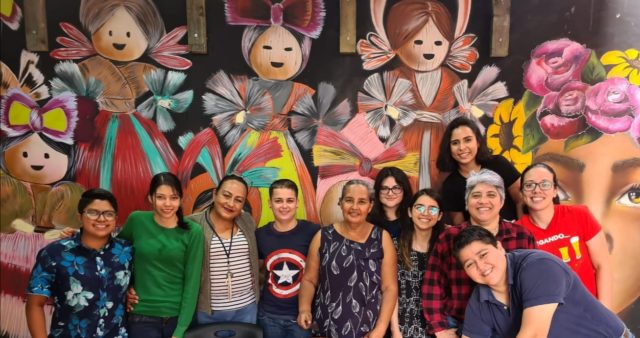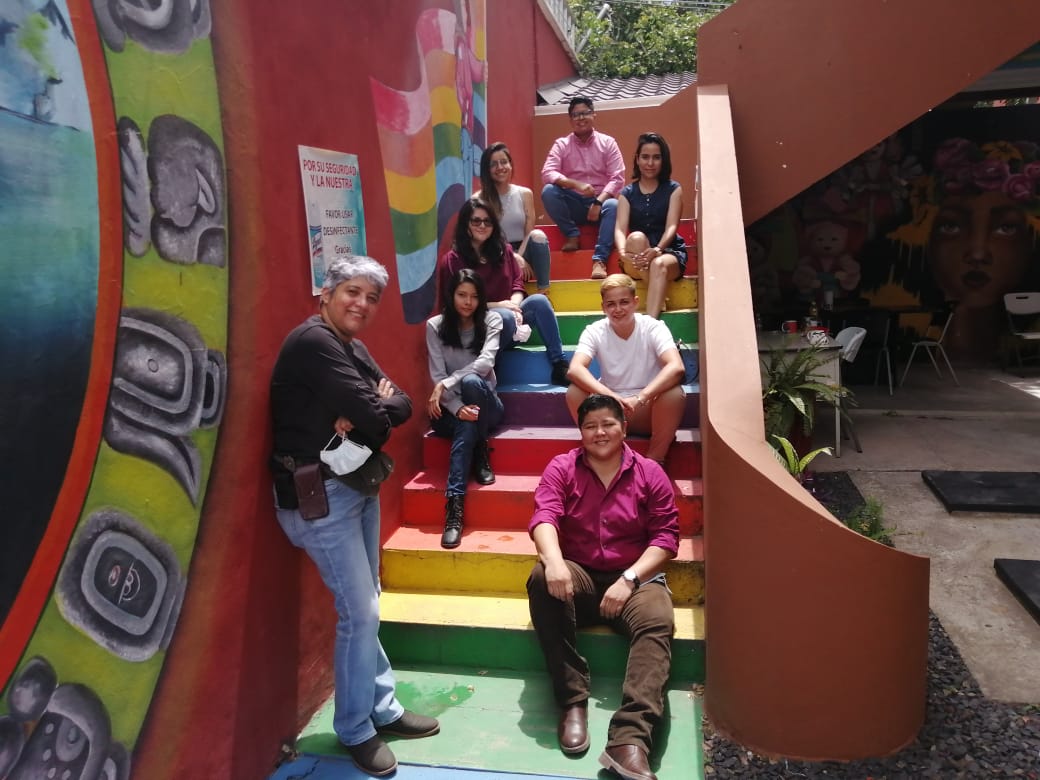“Honduras has the first place in every bad thing you can imagine: violent deaths of LGBTI people, corruption, climate change, poverty, everything,” says Indyra Mendoza.
She seems surprisingly upbeat given the message, holding up one index finger to claim Honduras’s place at the top — or perhaps the bottom. “Everything bad happens.”
Indeed, reports are grim, especially where LGBTQ+ rights are concerned. While the Latin American country might not be number one in all things bad — the Global Peace Index, which ranks countries based on increasing levels of conflict, currently lists it at 119 out of 163 countries, two spots above the United States — its reputation for danger is well-earned. The murder rate in Honduras is among the highest in the world according to Human Rights Watch, police are ineffective and often corrupt, and rights’ abuses are part of the status quo. A report filed by the Inter-American Commission on Human Rights (IACHR) in 2018 found that “LGBTI persons in the country continue to live in contexts characterized by frequent physical, psychological, and sexual violence” and that convictions in cases of violence are rare.
But if her optimistic tone is any indication, Mendoza isn’t easily dissuaded or intimidated. She’s the general coordinator and one of the original founding members of Red Lesbica Cattrachas, a feminist lesbian network that tracks anti-LGBTQ+ violence in Honduras in order to establish the need, and advocate for, equal protections under Honduran law.
It’s a tall order to meet by most measures. In addition to being riddled with endemic corruption, the morally conservative Honduras extends no protections to persons based on sexual orientation or identity, and officials refuse to investigate hate-based motivations into crimes committed against the LGBTQ+ community.
But it’s a fight that the team at Cattrachas has been in for a long time, and Mendoza, who has been there since the beginning, isn’t going anywhere. She speaks quickly and animatedly through her translator Astrid Ramos, although Mendoza often begins answering my questions in Spanish before Ramos has a chance to translate for her. As I recognize little in Mendoza’s answers beyond “si,” I very much need Ramos’s bilingual skills to help us communicate. I’m aware of just how often words related to violence, death, and murder crop up, along with others, too: living, recording, surviving.

Mendoza started Cattrachas in 2000, along with four other founding members. They’d founded Cattrachas initially as a means to track and counteract anti-LGBTQ+ and discriminatory messaging propagated through the country’s media. A few years later, when a surge of religious fundamentalism swept the country following the legalization of same-sex marriage in Spain, Mendoza was the only remaining founder left at Cattrachas; the others had died, fled the country, or returned to the closet for professional reasons. Of the members who died, one — a trans woman — was murdered.
The attacks on LGBTQ+ from fundamentalists started “because they were afraid that [what happened in Spain] would happen in Honduras as well,” she says. “The majority of the attacks were in discriminatory speeches or hate speeches in the media and were actually trying to send the message that LGBTI people were immoral.”
But things changed dramatically in 2009 when the military removed President Manuel Zelaya from office in the first Central American coup since the 1980s. In the days that followed, the National Congress appointed its president, Robert Michelette, to replace Zelaya; protestors took to the streets, which were effectively in the hands of the military; and civil rights were suspended during a nightly curfew. Attacks on the LGBTQ+ community went from rhetorical to physical.
“It was as if they had the opportunity to start a new country without the immorality that LGBTI people represent,” Mendoza says, “and we haven’t been able to stop this escalating of violence.”
According to Cattrachas’s Violent Death Observatory, which tracks violence against the LGBTQ+ community, 372 people have been killed in Honduras since the coup: 210 gay men, 43 lesbians/queer women, and 119 trans persons (1 of whom is missing and presumed deceased). 21 of these deaths occurred in 2020.
Following the coup and the spike in violence, Cattrachas shifted its focus from monitoring media attacks to tracking and recording physical assaults and homicides committed against the country’s LGBTQ+ community. The shift required that the organization upgrade its data-collecting system. The new system, known as TMIS, allowed the organization to more thoroughly track the names, sexual orientations, and identities of those killed and to trace the progress of their cases through the judicial system. In short, it allowed them to collect more thorough data and make a stronger, evidence-based case for the need for LGBTQ+ protections.
And while justice might be slow, even non-existent, in the Honduran system, Cattrachas currently has five cases pending before the Inter-American system. One such case, argued before the Inter-American Court for Human Rights last November, is that of Vicky Hernandez, the first trans woman killed during the coup. Cattrachas, along with Robert F. Kennedy Human Rights, which represents Hernandez’s family in court, argues that the Honduran government is responsible for Hernandez’s death in that it failed not only to protect her life but to investigate her murder and hold her killer — or killers — responsible.
15 trans women, including Hernandez, were killed during the coup — “assassinated,” Ramos tells me, “with very similar characteristics:” They were killed after the curfew, most by gunshots to the head, their bodies left in the streets likely by military forces. (In a report filed on the case of Hernandez, the IACHR also concluded that military forces and other state actors were likely responsible for 23 recorded deaths of LGBTQ+ people during the coup.) But Hernandez’s case, as the first, carries symbolic significance. Mendoza, who’d been one of only four persons left at Cattrachas during the coup, had first registered Hernandez’s death into the Observatory. Or, as Ramos put it, “Indyra lived” and so had registered the case.
“She didn’t think of this case as our case of strategic litigation in the future, but as a very important event that had to be followed,” Ramos explains. “She had a feeling that it was going to be important.”

Cattrachas first lodged a petition on behalf of Hernandez with the IACHR back in 2012. In 2018, the Commission sided with the organization, finding that the Honduran government had violated Hernandez’s right to life, humane treatment, equal protection, and her right to a fair trial. The Commission further recommended that the government provide compensation for Hernandez’s family, provide a full investigation into her murder, and enact nondiscriminatory legislation to protect LGBTQ+ persons. When the government failed to follow through on the recommendations, the case then went into the Inter-American Court. A verdict in the case is still pending; however, a ruling against the government by the Inter-American system could force Honduras finally to act.
“We don’t have anything. We don’t have rights in this country,” Mendoza says. “Vicky represents the hate the government and the state of Honduras, and the society here has towards the totality of LGBTI people. So with her, we want to represent that it is possible to make justice for everyone and to eliminate any law that discriminates against us just based on sexual orientation and gender identity.”
Of the five cases currently in the Inter-American system, two — that of Vicky Hernandez and another woman, Leonela Zelaya — involve trans femicide; there is one case each involving police assault, a petition for a name change, and a challenge for intimate visits in jail.
I ask Mendoza what advances she expects to see for Honduras’s LGBTQ+ community in the next two or three years. She’s hopeful, she tells me, that transgender persons will soon be legally able to change their names, and that LGBTQ+ persons could earn the right to intimate visits in prison. “And we hope that equal marriage is also something we can advance in the next [few] years,” she says.
The week following our conversation, a vote by the Honduran Congress now requires that a three-quarters super-majority is needed to vote out existing bans on both abortion and same-sex marriage in the country’s constitution. The vote is a reminder of why outside intervention, such as from the Inter-American Court, may be necessary to affect change, and of the deeply entrenched conservative forces that groups like Cattrachas are up against.
Human rights defenders are, like the groups they advocate for, frequent targets for harassment, abuse, and even violence. The IACHR report of 2018 determined that “human rights defenders continue to face an extreme risk situation due to the permanent violence, criminalization, and delegitimization to which they are exposed.” Women human rights defenders are particularly vulnerable, accounting for 24% “of all aggressions suffered in 2016 and 2017.”
Mendoza, for her work with Cattrachas, has been provided protective measures from outside organizations, including the IACHR and the Universal Protection System of the U.N. While Cattrachas does share its data with state actors within the justice system — sometimes to positive legal results — the state, itself, is often the adversary; its actors are the ones people need protection against.
For example, in 2008, Mendoza worked on behalf of a trans woman, Nohelia Flores Alvarez, who’d been abducted and stabbed 17 times by an off-duty police officer. Flores’ case went to court, and against the odds, the officer was convicted in 2010. However, the case was fraught with witness intimidation, the lead investigators were threatened, and Flores was kidnapped and threatened with death if she didn’t drop the case. She had to leave the country for her own safety, Ramos says, after the case was resolved in her favor.
As for Mendoza, Ramos explains, the officer threatened “to kill her by his own hands and that her body was going to be found all over Tegucigalpa [Honduras’ capital].”
Yet, in spite of the ongoing complications, things have gotten better. Today’s LGBTQ+ Hondurans can come out of the closet; they don’t have to worry about being spit on in the street, nor do they have to endure the sight of deceased loved ones forcibly dressed in funeral garb that doesn’t match their gender identity, Mendoza says.
“I’ve learned not to be afraid,” says Ramos, who is a lawyer with Cattrachas and one of its next generation of advocates. “I now identify myself as bisexual. I think that all the courage that [Mendoza] inspires in me and all her generation — being surrounded by people who’ve been out for so long — it hasn’t been as hard.”
For Ramos’s generation, who’ll pick up the mantle where their predecessors left off, “the most important thing is to hold on and resist,” says Mendoza.
Her proudest achievement is a reflection of the progress Cattrachas has made since its beginnings, back when such progress may have seemed all but impossible. “It was very important to us to show to the world and other organizations that a very small network and organization of lesbian women in Honduras can get through the Inter-American Court with evidence that we have been able to not only collect but preserve,” she says. It’s important, she adds, that LGBTQ+ groups around the world be ready to do the same when necessary to fight for their rights.
So after two decades in advocacy, fending off death threats and religious fundamentalists, why stay in Honduras, I ask. Mendoza answers before Ramos has a chance to translate. The answer, when Ramos relays it to me, is simple: “She’s not afraid anymore.”


What Do You Think?